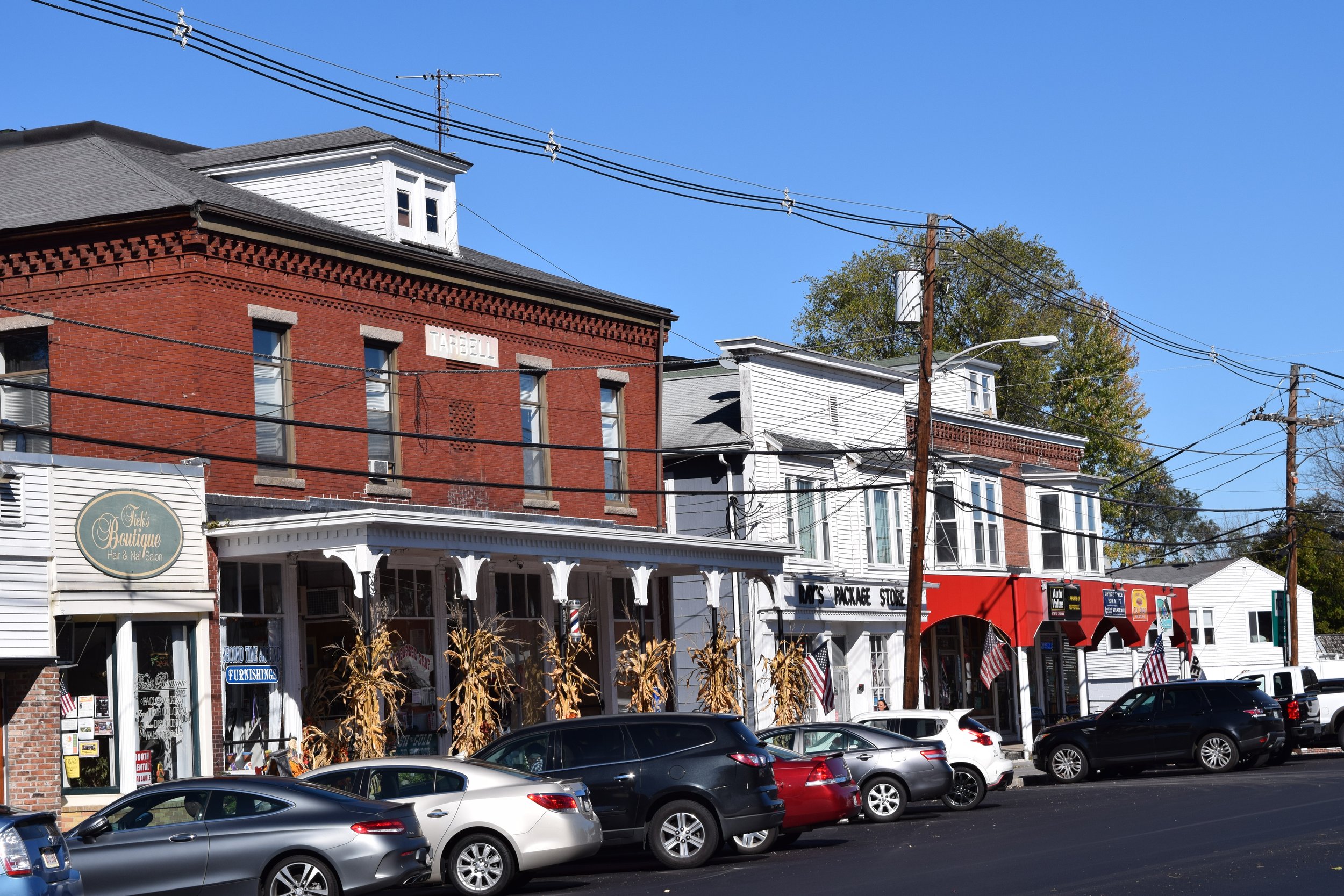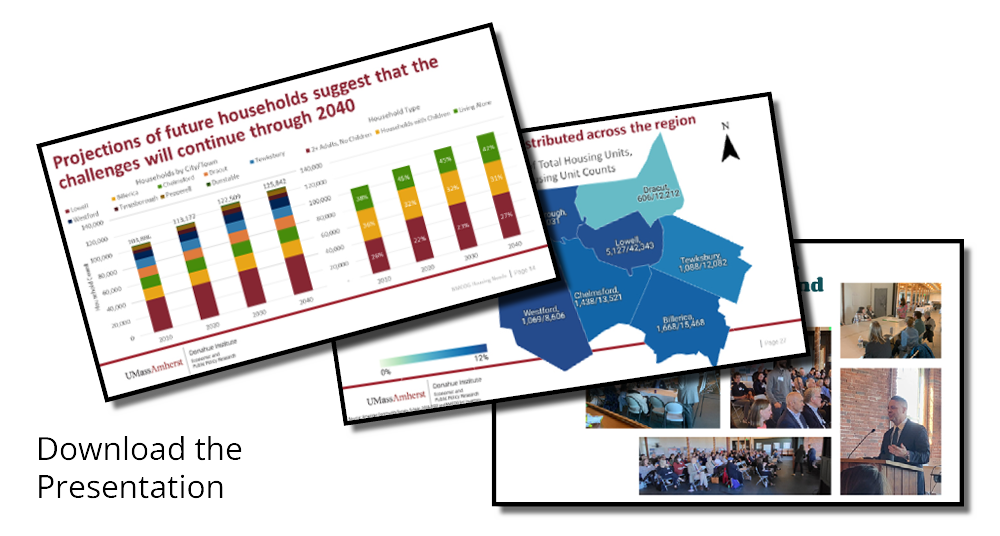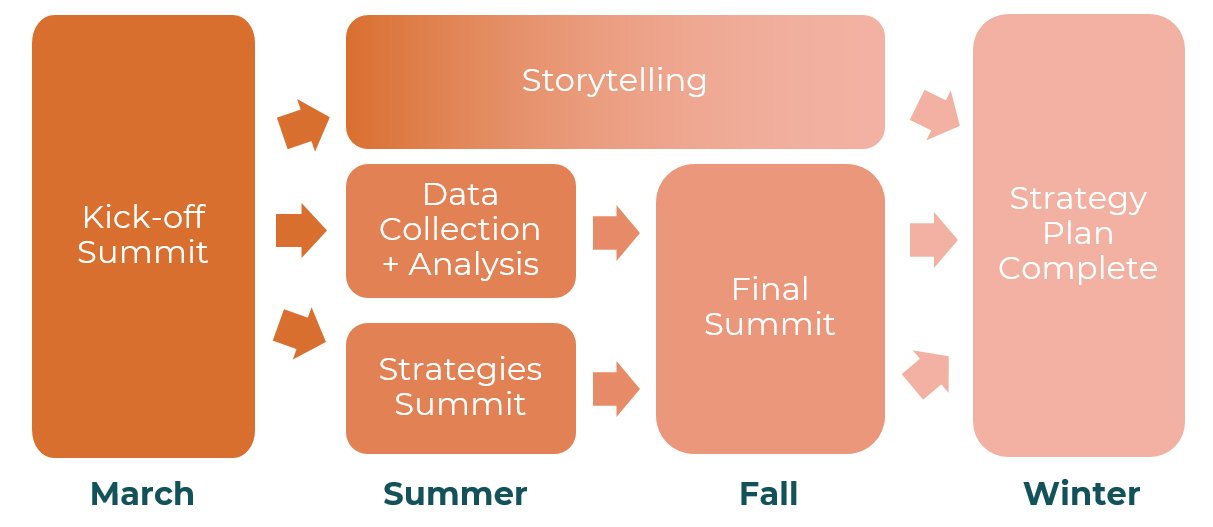
Economic Development & Housing
At Home in Greater Lowell is a year-long planning process that will result in a new regional housing plan. The plan will not only include measurable, achievable benchmarks and strategies based on data analysis and community input, but will go beyond this by documenting the first-hand experiences of people living in diverse housing situations in their own words. Furthermore, the plan’s strategies and recommendations will include a toolkit of implementation and public education materials so our communities can take action. These three components come together to balance data with narrative–putting faces and stories behind the facts—and provide educational tools that communities can use to talk about housing policy and zoning.
Summit 3: Ideas to Action (2024 Fall Housing Summit)
During the evening of November 7, 2024, Ideas to Action brought together nearly ninety representatives of the housing continuum from finance and development, to elected officials and policy makers, to service providers.
Download the draft strategies discussed at Ideas to Action here (189 kb, PDF).
Download the general presentation here (2,156 kb). Download individual speaker presentations below.
The event included:
Keynote Address
Ed Augustus, Secretary of the Massachusetts Executive Office of Housing and Livable Communities
View the presentation on YouTubeMunicipal Financial Impacts
Doug Howgate, President of Massachusetts Taxpayers FoundationDownload the Presentation (532 kb, PDF)
View the presentation on YouTubeEffective Communication and Engagement
Whitney Demetrius, Director of Fair Housing and Municipal Engagement and Sadé Ratliff, MEI and Fair Housing Associate of Citizens Housing and Planning Association (CHAPA)Download the Presentation (1,046 kb, PDF)
View the presentation on YouTubeAudience Questions and Answers
Whitney Demetrius, Doug Howgate and Sadé Ratliff, panelists, and Jenny Raitt, Moderator
View the Q&A on YouTube
The summit ended with the results of the year-long process to create a housing strategy for the Greater Lowell region, including breakout groups in which participants discussed the strategies and collaboration across the region on implementation. High-level takeaways included:
The possibility of considering modular housing and innovative financing mechanisms for affordable housing in the strategies;
The critical need for public outreach and education to break down misconceptions and build consensus toward solutions; and
The need for additional resources for organizations serving the most vulnerable populations, including housing-insecure and unhoused populations.
Many participants re-emphasized the need for progress on all six goals to move forward in unison – all are necessary to tackle the housing challenges the region faces. That said, the most important feedback was the need to begin implementation! The challenge is great, and the need to act is urgent.
Learn about our previous summits!
Summit 2: Strategies Summit
Our second summit focused on confirming goal language and developing and prioritizing strategies to achieve those goals. Nearly eighty people representing each municipality in Greater Lowell attended.
Download the presentation from our Strategies Summit that includes a housing needs assessment and the draft goals. (1,607 kb, PDF)
Take the Strategies Survey to build upon the work at the second summit.
Summit 1: Kick-Off
Our first summit focused on visioning, the creation of goals, and setting research questions for the planning process. Over eighty elected officials, board members, experts in housing, public and nonprofit staff, and residents participated.
Download the presentation from our Kick-off Summit that includes more information about the housing strategy and from our guest panelists. (4,091 kb, PDF)
Review the meeting summary from our Kick-off Summit including transcripts of vision, goals, and questions from four breakout groups. (151 kb, PDF)
Why create a regional housing strategy?
It’s not just the Boston Globe talking. Housing emerges as a top issue throughout our communities:
Municipal staffing shortages
CEDS and other Economic Development plans
Middlesex 3 Coalition meetings
Region-wide data
This is confirmed by data.
Median sales price of a home has risen by more than 60%, while median income has risen only around 10%.
The number of Greater Lowell households is projected to increase, but household size is projected to decrease.
One reason housing costs so much is that our vacancy rate is lower than the US average AND lower than a healthy market.
As a result, almost 1/3 of Greater Lowell households are housing cost burdened, paying more than 30% of income on housing, disproportionately at the lowest end of the income spectrum.
Greater Lowell is in need of solutions—at local and regional levels—to create more front doors for more folks.
Plan Elements and Timeline
At Home in Greater Lowell has several major goals:
Move housing discussions and decisions into an equity and fair housing framework.
Connect housing goals with economic development goals.
Identify and advocate for the resources communities need to meet housing types and production goals.
Find the unique role each community can play in addressing the housing shortage.
It will do this through three major elements:
Data: Measurable, achievable benchmarks for each community based on data and community in; goals for the region and each community’s contribution toward those goals; and strategies to achieve the goals.
Stories: Personal stories from residents and organizations about housing challenges and successes. These narratives will connect faces and stories to the data, and can live beyond the project.
Tools: Implementation toolkits for staff, communities, boards, committees, leaders, and residents enact the strategies. These tools will include educational materials to assist in building support for strategies and will develop a “common language” to use in housing discussions.
Schedule
Central to the planning process is a series of three summits, starting March 2024. The summits will bring together municipal staff, elected officials, local boards and committees, housing-focused nonprofit staff, for-profit businesses such as developers and banks, state and federal partners, and the general public, with the shared objectives to solicit input, forge partnerships, increase buy-in, and coordinate implementation. Data collection and analysis and storytelling will occur throughout the process, with completion of the plan projected for late fall 2024.
How to get involved
Join our mailing list
Sign up for the mailing list to receive updates on the plan and opportunities to join. This will include storytelling sessions and the date of our final summit.
Share your vision and goals for homes in the region
At our kickoff summit, we collected attendees’ vision, goals, and additional research questions to inform our housing strategy. At the Strategies Summit, we began the process of confirming goals and brainstorming strategies to meet those goals. Take strategies survey to share your thoughts on goals and strategies.
Help us tell the story of housing in Greater Lowell
To better understand people’s different housing experiences and engage more residents in the planning process, NMCOG and Stellar Story Company are collecting meaningful housing stories, some of which will be shared in our upcoming public education campaign entitled 'Home is Everything.' To help us connect with people with stories in your community or share your campaign ideas, please complete this survey or connect directly with stellar at info@stellarstory.com

















